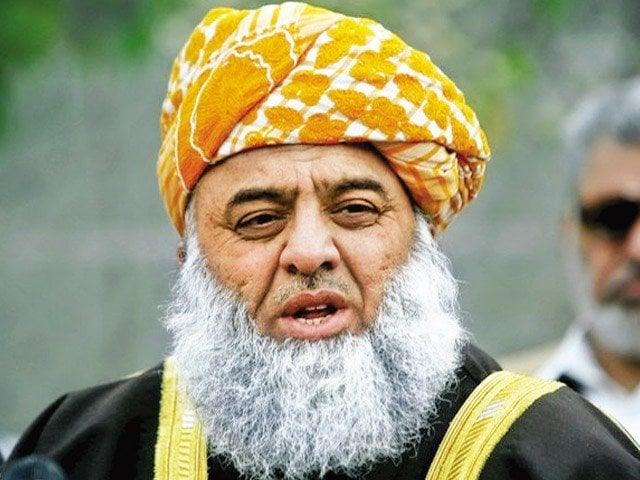ISLAMABAD:
After years of political wrangling, key political players have reached a consensus that talks are the only way forward to achieve much-needed political and economic stability in the country and counter internal and external challenges, it emerged on Friday. .
Amid talks between the PML-N-led government and the opposition PTI, JUI-F chief Maulana Fazlur Rehman is the latest to support the process, saying that talks between political parties “are an important part of the democratic process” and must continue. .
The JUI-F chief, speaking to government negotiation committee spokesperson Senator Irfan Siddiqui, said avoiding reconciliation and refusing to negotiate with political forces was undemocratic behaviour, stressing that important issues can only be resolved through the dialogue.
Ahead of the Maulana-Siddiqui meeting, PTI Information Secretary Sheikh Waqas Akram held a press conference to emphasize that PTI will continue to hold talks with the ruling coalition even if PTI founding president Imran Khan received a sentence over the £190m corruption reference in January. 6.
The PTI information secretary’s statement came after the party adopted a wait-and-see policy to see the judgment in the National Accountability Bureau’s (NAB) corruption reference against Khan and others, including his wife.
Following the second meeting between the government and the PTI on January 2, it emerged that the PTI was taking time to present its black and white letter of demands, citing that instructions from the party’s jailed leader were needed to move forward.
Meanwhile, PTI Vice President Shah Mahmood Qureshi, while speaking to reporters during his appearance before an anti-terrorism court in Lahore, highlighted the need for negotiations between the two sides and said that dialogue is not a need of the PTI but of Pakistan. .
The former foreign minister, who is in prison after the May 9 incident, warned that the failure of the ongoing negotiation process could endanger democracy in the country. Qureshi said Pakistan is at a critical juncture and all democratic forces should seriously pursue the talks process.
Qureshi said the PTI’s demands: immediate release of jailed workers and former Prime Minister Imran Khan; to establish a judicial commission to investigate the events of May 9 and November 26 – were not far-fetched. However, he warned that the government will collapse if the outcome of the talks is not positive.
Earlier, Senator Siddiqui had also said that the government will consider the written demands of the PTI without paying attention to the statements of Imran Khan or anyone else. The senator had termed the meeting between the PTI and PMLN, along with other political parties, a mere act of sitting together as a breakthrough.
Siddiqui had also said that the Ministry of Home Affairs was sent on the first day to facilitate the PTI negotiating committee members in their meeting with Khan and this facilitation will continue in the future as well.
This rare cross-party consensus emerged on the heels of talks between the government and the PTI that began on December 23, 2024 to address political tensions that have plagued the country for too long. Although there are high hopes pinned on the talks between the government and the PTI, things have so far not gone beyond verbal discussions in the first two meetings.
However, the start of the dialogue reflects a change in political dynamics, as both sides appear willing to explore a negotiated solution to the impasse. The PTI’s softened stance in Parliament, along with Imran Khan’s directive to form a five-member negotiating team, had prompted the government to reciprocate by forming its own committee.
Once the PTI submits its demand letter, the ruling coalition will examine it and further deliberations will determine the trajectory of the dialogue. Both sides have expressed optimism, but the real test lies in their ability to bridge deep political divisions and prioritize national interests over partisan agendas.
On December 12, in a bid to calm tensions and improve relations, the ruling PML-N and the opposition PTI agreed to open formal communication channels, a move that aimed to replace confrontation with constructive dialogue, address long-standing issues data and try to stabilize the ship of political stability.
Following simmering tensions between the two sides, particularly after the November 26 clash, the deadlock was broken when PTI leader Asad Qaiser and Salman Akram Raja met National Assembly Speaker Sardar Ayaz Sadiq in Parliament to offer his condolences on the death of his sister.
During the meeting, both the current and former NA presidents agreed that it was time to join forces. They had proposed forming committees to sit and discuss the thorny issues in parliament that have repeatedly driven a wedge between the two parties.
Later, Sadiq, while chairing the meetings, expressed hope that all parties involved would continue discussions constructively. Highlighting his role as a facilitator, the speaker has now suggested that Pakistan’s pressing issues, including terrorism and economy, should also be discussed within the committee.
On January 2, while talking to media, PTI leader Asad Qaiser also said that the negotiation process is long and nothing happens in just two meetings, and said that PTI will listen to the government and also express its opinion in conversations. Similarly, Ayub, responding to a question on whether real talks were taking place elsewhere, said the lawmakers were members of Parliament and were only holding talks here.
The next meeting between the government and the PTI is expected next week. Once the ruling on the corruption reference against Khan is issued and the PTI submits its letter of demands in writing, the talks will enter a decisive mode as all eyes will then be on the ruling coalition how it responds to the proposals. .




